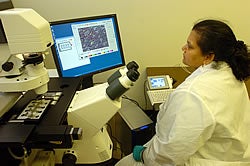Grant funds new instrument at ECU
GREENVILLE, N.C. — Thanks to a $163,539 grant, researchers at the Brody School of Medicine now have laser-capture microdissection technology for biomedical research that could lead to advances in treating cancer and other diseases.
Dr. Mary Jane Thomassen of the Department of Internal Medicine spearheaded a proposal to the North Carolina Biotechnology Center to obtain a Zeiss PALM laser-capture microdissection instrument for collaborative use at ECU.

Anagha Malur, a research specialist in the division of pulmonary and critical care medicine at the Brody School of Medicine, trains on the school’s new Zeiss PALM laser-capture microdissection instrument. Photo by Cliff Hollis
The German-made instrument arrived April 23, and researchers trained on it last week. Thomassen, a professor and director of lung biology and translational research in the division of pulmonary and critical care medicine, said interest in the instrument has been high. “We’ve been waiting a long time for this,” she said.
Laser-capture microdissection is an advanced, molecular-level biomedical research technique allowing scientists to isolate and investigate individual cells from a tissue sample. In addition to cancer, the technology will assist research in cardiovascular and pulmonary disease, immunology and other areas. The instrument is one of only two of the most advanced Zeiss models in the country, Thomassen said.
The grant for the instrument was among 13, worth a total of $1.9 million, NCBC announced in February. NCBC made the grants to four North Carolina universities to boost biotechnology research and teaching collaborations. NCBC requires the grants be matched at least 25 cents on the dollar by other funding sources. Various ECU academic departments matched the grant with approximately $40,000 to purchase the $204,000 instrument.
According to ECU scientists, biological research at the molecular level is critical to solving the problems of human disease. Laser capture microdissection enables researchers to investigate DNA and proteins from specific cells or groups of cells free of adjacent tissue or contact contaminants.
Co-investigators on the grant proposal were Dr. Barbara Muller-Borer, assistant professor of medicine; Dr. Qun Lu, associate professor of anatomy and cell biology; Dr. Douglas Weidner, research instructor of microbiology and immunology; and Dr. Larry Dobbs, associate professor of pathology and laboratory medicine. Other researchers from the medical school and east campus plan to use the machine, Thomassen said.